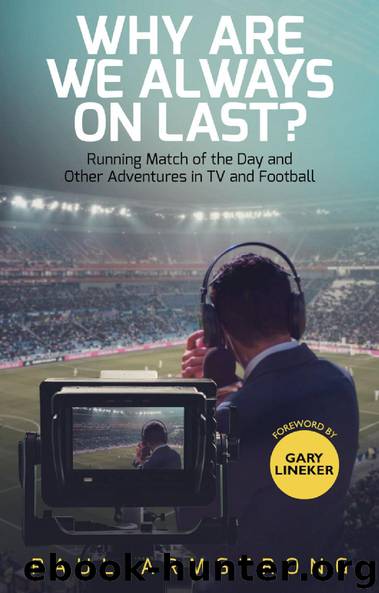Why Are We Always On Last? Running Match of the Day and Other Adventures in TV and Football by Paul Armstrong

Author:Paul Armstrong
Language: eng
Format: epub
Publisher: Pitch Publishing
Published: 2019-03-15T00:00:00+00:00
6.
Auntie Social
No one at the BBC is ever allowed to forget that they are employed by the public, or at least the law-abiding ones who pay their licence fee. Audience feedback and increasingly participation go with the territory, particularly when you take charge of programmes watched by millions.
When I joined the BBC in the late 80s, and for a decade or so afterwards, there were three main ways for a viewer to make their opinions known to a programme maker: a phone call, a letter, or by knowing or meeting someone who worked on the programme. If you were in the industry, you could also carp directly or indirectly, sometimes to some effect. One of my first chances to edit a match for Match of the Day was an FA Cup tie in the early 90s. It was a gutsy, against the run of play, giant-killing performance by a Third Division side against top-flight opposition. Instead of basking in the afterglow, the winning manager – let’s call him Colin – singled out MOTD in his local press for producing an edit allegedly biased against his team. Our studio producer, Vivien Kent, got wind of this accusation, and, not unreasonably, asked me about it. I dug out my log of the game and took it into Viv’s office. Although Colin’s team had played out of their skins in a hanging-on-for-grim-death way, their opponents had almost all the best chances in the game but either missed them or were foiled by the keeper. Inevitably, this is what a relatively short edit is mostly going to feature. Fortunately, I wasn’t taken off match-editing duty, nor have I held a grudge against ‘one of the game’s characters’ for the last quarter of a century …
But back to complaints from the public. Phone calls were logged by the wonderfully named Duty Office – what a great, public service-inspired name it sounds, though it only really meant the poor sod on phone duty when, say, Match of the Day was live on the air – and passed on to the editor of the programme. A significant volume of calls on any contentious subject and you’d be expected to reply. ‘I didn’t like Des Lynam’s tie tonight’ would be passed on, but you didn’t have to do anything about it. I don’t think there were any rules about letters, but if someone had taken the trouble to put pen to paper it was felt by our department that they should get a reply.
As I was later to discover as editor, most of the correspondence to Match of the Day was as one-eyed as Colin the manager: supporters of team A swearing blind that the programme was wildly biased against them and conducting a love affair with their local rivals, team B. As a multi-sports programme, Grandstand ’s post bag had mostly consisted of aficionados of various sports failing to see the overall editorial picture. It must seem bizarre to a younger generation brought up on sports channels,
Download
This site does not store any files on its server. We only index and link to content provided by other sites. Please contact the content providers to delete copyright contents if any and email us, we'll remove relevant links or contents immediately.
Call Me by Your Name by André Aciman(20501)
Ready Player One by Cline Ernest(14645)
How to Be a Bawse: A Guide to Conquering Life by Lilly Singh(7472)
Wiseguy by Nicholas Pileggi(5771)
The Kite Runner by Khaled Hosseini(5170)
On Writing A Memoir of the Craft by Stephen King(4936)
Audition by Ryu Murakami(4923)
The Crown by Robert Lacey(4807)
Call me by your name by Andre Aciman(4676)
Gerald's Game by Stephen King(4642)
Harry Potter and the Cursed Child: The Journey by Harry Potter Theatrical Productions(4503)
Dialogue by Robert McKee(4389)
The Perils of Being Moderately Famous by Soha Ali Khan(4217)
Dynamic Alignment Through Imagery by Eric Franklin(4208)
Apollo 8 by Jeffrey Kluger(3705)
The Inner Game of Tennis by W. Timothy Gallwey(3682)
Seriously... I'm Kidding by Ellen DeGeneres(3629)
How to be Champion: My Autobiography by Sarah Millican(3590)
Darker by E L James(3512)
